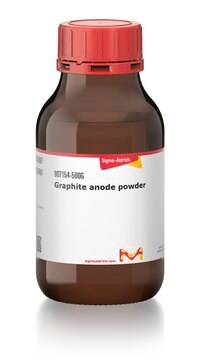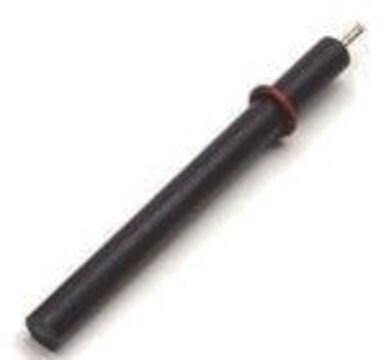496553
Grafite
rod, L 150 mm, diam. 6 mm, 99.995% trace metals basis
Autenticatiper visualizzare i prezzi riservati alla tua organizzazione & contrattuali
About This Item
Formula empirica (notazione di Hill):
C
Numero CAS:
Peso molecolare:
12.01
Numero CE:
Numero MDL:
Codice UNSPSC:
12352103
ID PubChem:
NACRES:
NA.23
Prodotti consigliati
Grado
battery grade
Livello qualitativo
Saggio
99.995% trace metals basis
Stato
rod
PM
Mw 12.011 g/mol
Composizione
C
Lunghezza
150 mm
Diametro
6 mm
Punto di fusione
3652-3697 °C (lit.)
Densità
at 25 °C (low density)
2.26 g/cm3 (lit.)
applicazioni
battery manufacturing
Stringa SMILE
[C]
InChI
1S/C
OKTJSMMVPCPJKN-UHFFFAOYSA-N
Cerchi prodotti simili? Visita Guida al confronto tra prodotti
Quantità
180.7 g = 25 rods
Codice della classe di stoccaggio
11 - Combustible Solids
Classe di pericolosità dell'acqua (WGK)
nwg
Punto d’infiammabilità (°F)
Not applicable
Punto d’infiammabilità (°C)
Not applicable
Dispositivi di protezione individuale
dust mask type N95 (US), Eyeshields, Gloves
Scegli una delle versioni più recenti:
Possiedi già questo prodotto?
I documenti relativi ai prodotti acquistati recentemente sono disponibili nell’Archivio dei documenti.
I clienti hanno visto anche
Stephanie Reich et al.
Philosophical transactions. Series A, Mathematical, physical, and engineering sciences, 362(1824), 2271-2288 (2004-10-16)
We present a review of the Raman spectra of graphite from an experimental and theoretical point of view. The disorder-induced Raman bands in this material have been a puzzling Raman problem for almost 30 years. Double-resonant Raman scattering explains their
PingHeng Tan et al.
Philosophical transactions. Series A, Mathematical, physical, and engineering sciences, 362(1824), 2289-2310 (2004-10-16)
Planar graphite has been extensively studied by Raman scattering for years. A comparative Raman study of several different and less common non-planar graphitic materials is given here. New kinds of graphite whiskers and tubular graphite cones (synthetic and natural) have
Craig E Banks et al.
Analytical sciences : the international journal of the Japan Society for Analytical Chemistry, 21(11), 1263-1268 (2005-12-02)
The recent development, behavior and scope of edge plane pyrolytic graphite electrodes in electroanalysis are overviewed. Similarities to, and advantages, over multi-walled CNT modified electrodes are noted and the wide scope of applications, ranging through gas sensing, stripping voltammetry and
R Hanoa
Scandinavian journal of work, environment & health, 9(4), 303-314 (1983-08-01)
Six hundred and five cases of graphite pneumoconiosis have been reported in the literature. In 39 cases the diagnosis was based on or supported by autopsy or lung biopsy results. Only 14 of the 39 cases were presented with relatively
M A Pimenta et al.
Physical chemistry chemical physics : PCCP, 9(11), 1276-1291 (2007-03-10)
Raman spectroscopy has historically played an important role in the structural characterization of graphitic materials, in particular providing valuable information about defects, stacking of the graphene layers and the finite sizes of the crystallites parallel and perpendicular to the hexagonal
Il team dei nostri ricercatori vanta grande esperienza in tutte le aree della ricerca quali Life Science, scienza dei materiali, sintesi chimica, cromatografia, discipline analitiche, ecc..
Contatta l'Assistenza Tecnica.



